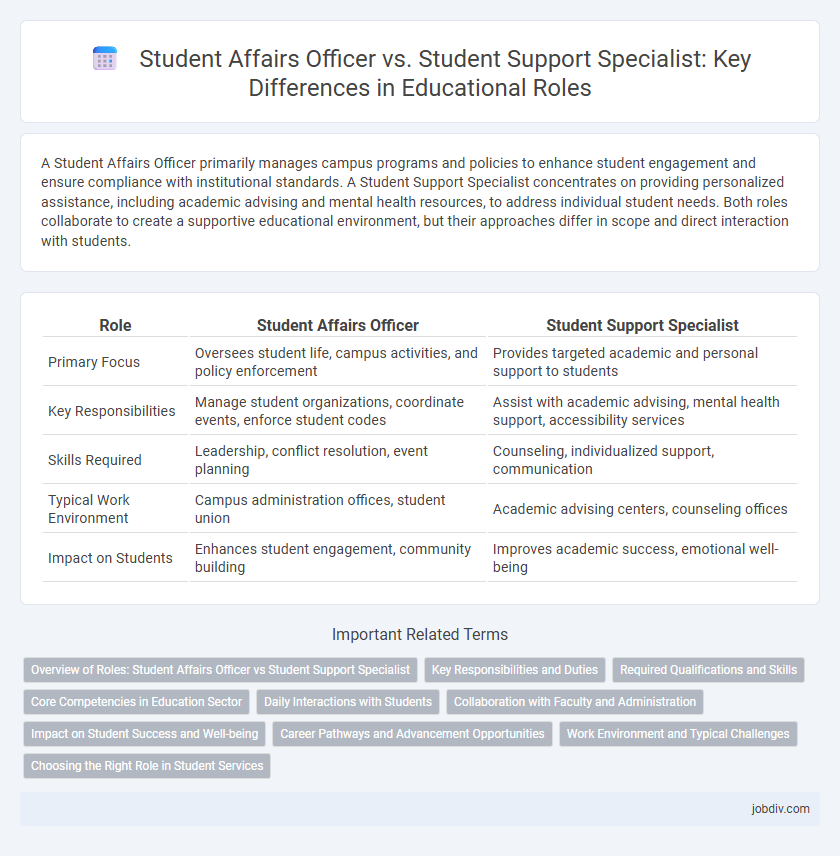A Student Affairs Officer primarily manages campus programs and policies to enhance student engagement and ensure compliance with institutional standards. A Student Support Specialist concentrates on providing personalized assistance, including academic advising and mental health resources, to address individual student needs. Both roles collaborate to create a supportive educational environment, but their approaches differ in scope and direct interaction with students.
Table of Comparison
| Role | Student Affairs Officer | Student Support Specialist |
|---|---|---|
| Primary Focus | Oversees student life, campus activities, and policy enforcement | Provides targeted academic and personal support to students |
| Key Responsibilities | Manage student organizations, coordinate events, enforce student codes | Assist with academic advising, mental health support, accessibility services |
| Skills Required | Leadership, conflict resolution, event planning | Counseling, individualized support, communication |
| Typical Work Environment | Campus administration offices, student union | Academic advising centers, counseling offices |
| Impact on Students | Enhances student engagement, community building | Improves academic success, emotional well-being |
Overview of Roles: Student Affairs Officer vs Student Support Specialist
Student Affairs Officers manage campus programs and student services, focusing on leadership, policy implementation, and enhancing the overall student experience. Student Support Specialists provide direct assistance to students, addressing academic, emotional, and social needs through personalized counseling and resource referrals. Both roles collaborate to foster student development but differ in their primary focus on administrative management versus individualized student support.
Key Responsibilities and Duties
Student Affairs Officers primarily manage campus activities, student organizations, and policy enforcement to enhance student engagement and campus life. Student Support Specialists focus on providing personalized assistance, including academic advising, mental health support, and resource referrals to promote student success and retention. Both roles collaborate to foster a supportive educational environment but differ in their emphasis on administrative coordination versus direct student services.
Required Qualifications and Skills
Student Affairs Officers require a bachelor's degree in education, counseling, or a related field, with strong communication, conflict resolution, and organizational skills. Student Support Specialists often hold certifications in student counseling or social work, emphasizing skills in emotional support, crisis intervention, and individualized student planning. Both roles demand proficiency in team collaboration and a deep understanding of student development theories.
Core Competencies in Education Sector
Student Affairs Officers excel in conflict resolution, event coordination, and campus policy enforcement, ensuring a holistic student experience. Student Support Specialists specialize in academic advising, mental health support, and individualized learning plans, directly addressing student well-being and success. Both roles require strong communication, problem-solving, and cultural competency skills essential for fostering inclusive educational environments.
Daily Interactions with Students
Student Affairs Officers primarily coordinate campus activities, address student concerns, and foster a supportive community through direct engagement at events and office hours. Student Support Specialists concentrate on personalized assistance by providing academic advising, mental health resources, and crisis intervention tailored to individual student needs. Both roles maintain regular communication with students but differ in their scope, with Officers focusing on broader student life dynamics and Specialists emphasizing targeted support services.
Collaboration with Faculty and Administration
Student Affairs Officers coordinate closely with faculty and administration to develop programs that enhance student engagement and campus life, ensuring alignment with institutional goals. Student Support Specialists collaborate with academic departments and administrative units to identify at-risk students and implement targeted interventions, fostering student retention and success. Both roles prioritize cross-departmental communication to create a supportive and inclusive educational environment.
Impact on Student Success and Well-being
Student Affairs Officers coordinate campus programs and student services, directly influencing student engagement and institutional retention rates through comprehensive policy implementation and event management. Student Support Specialists provide targeted academic and emotional support, utilizing counseling techniques and individualized interventions to improve student resilience, mental health, and success in coursework. Both roles collaborate to create a supportive campus environment that enhances overall student well-being and academic achievement.
Career Pathways and Advancement Opportunities
A Student Affairs Officer typically manages campus programs, student conduct, and engagement activities, providing broad experience valuable for leadership roles in higher education administration. In contrast, a Student Support Specialist focuses on direct academic advising, career counseling, and personalized student development, aligning closely with career services and educational guidance roles. Career pathways for Student Affairs Officers tend to lead toward Director of Student Affairs or Dean positions, while Student Support Specialists often advance into specialized roles such as Career Services Manager or Academic Success Coordinator.
Work Environment and Typical Challenges
Student Affairs Officers typically work in college campuses or university settings, navigating administrative structures while addressing student needs in a dynamic and fast-paced environment. Student Support Specialists often operate in schools or community organizations, collaborating closely with students facing personal, academic, or social challenges. Both roles encounter challenges such as resource allocation, managing diverse student populations, and balancing policy enforcement with empathetic support.
Choosing the Right Role in Student Services
Student Affairs Officers typically oversee campus programs, policy development, and student engagement initiatives, ensuring a broad institutional approach to student development. Student Support Specialists concentrate on individualized support services, including academic advising, counseling, and resource navigation to address specific student needs. Selecting the right role depends on whether one prefers managing holistic student services or providing targeted, personalized support within an educational setting.
Student Affairs Officer vs Student Support Specialist Infographic

 jobdiv.com
jobdiv.com